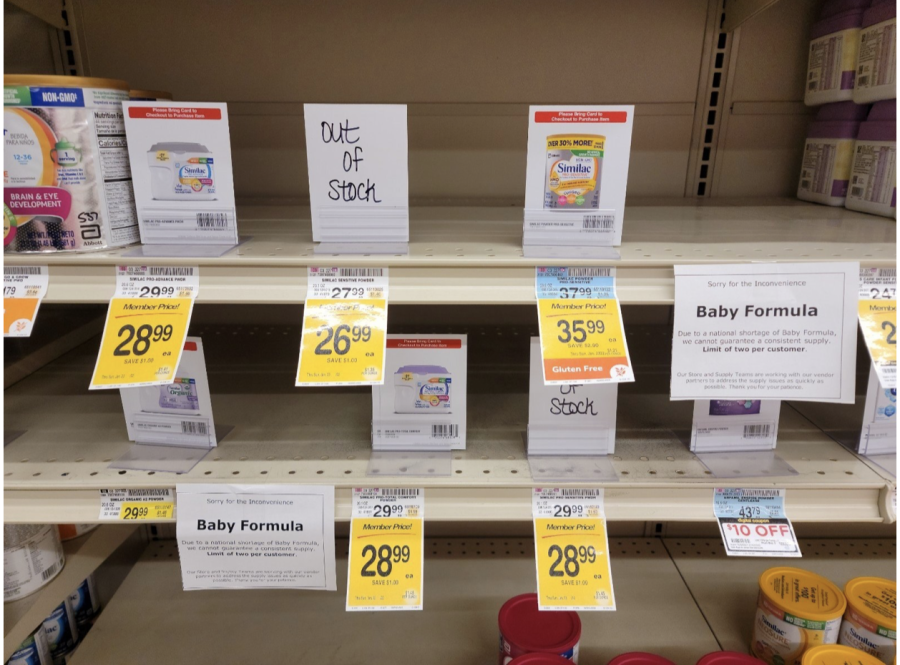America’s Ongoing Baby Formula Shortage
Bare shelves of infant formula at a Safeway store in Monroe, Washington, Source: Wikimedia Commons, License: https://creativecommons.org/licenses/by-sa/2.0/
September 27, 2022
Throughout America, families have been scrambling to find an irreplaceable necessity for their children: infant formula. As formula supply lowers, prices and demands rise, creating more struggle for parents. Many are starting to question, will this shortage ever end?
What is the Infant Formula Shortage?
The shortage began after one of the largest brands of formula was recalled. It was later shut down for contamination concerns and ever since, formula has been low in supply. The New York Times reports that 23% of powdered formulas are out of stock as of late August according to market research firm IRI (Store Shelves Are No Longer Bare, but Baby Formula Remains in Short Supply). Hypoallergenic and easy-to-digest formulas have been especially difficult to obtain. Low supply has impelled parents to buy all they can find on the shelves and hoard it for themselves. Although the availability is not back to its original state, the U.S. has progressed since its all-time low in May and early June.
How is this affecting families across the U.S.?
Millions of families have been hit by the shortage, some harder than others depending on many aspects such as location, income and race.
Glenbard South health and gym teacher, Mrs. Palmer, thinks that the formula shortage has been difficult for many families. She states, “The shortage has caused panic and has affected the community by constantly checking to see if shipments came in or if shelves are stocked.”
Additionally, Palmer shares her experience with one of her friends during the formula shortage. She describes, “One of my friends had a baby in July and I was constantly checking for her and buying formula whenever I saw her kind in stock. I tried to help so that she didn’t have to go to multiple stores with a newborn baby”.
Families living in rural locations struggle to find formula in their area. Parents describe it as a chore, having to travel many miles to find the brand their child needs, as stated in the New York Post article, “Baby formula shortage is easing for many, but it still isn’t over”. Some children cannot simply use whichever formula is available. It is a process of finding a certain type the baby can tolerate, then trying to find where it is sold. In many cases, supply runs out before the family can obtain it, forcing families into a seemingly never-ending cycle.
Minorities are also being greatly impacted by the infant shortage. It is harder to receive benefits and assistance as a person of color, as opposed to a white parent that could be experiencing the same issues. This also goes for single dads and gay parents.
The WIC program is a program which provides nutritional assistance for women, infants and children. This program accounts for half of the formula used in this country. Many families are now depending on WIC to provide for their babies, but these benefits are not accepted by all stores. This presents a new obstacle among the many that families are already facing.
What actions have been taken to help this issue?
The shortage is trying to be stopped by many groups: stores, social media companies and even governmental administrations, such as the FDA and the Biden-Harris administration.
Stores have been limiting the amount of formula one person can buy at a time. On social media platforms, like Facebook, groups have been created to connect parents around the nation. An example of one is Formula Hunters, a group that helps trade and locate infant formula for no extra cost.
The FDA and Biden-Harris administration have been taking measures to ensure that America’s supply of baby formula gets back to its original state. The FDA receives weekly updates and has arranged for nearly 18.9 million cans of formula to be transported to the U.S. This is thanks to new laws and regulations concerning foreign infant formula companies. Now, these companies are allowed to ship and sell their products throughout the nation until November 14th. President Biden’s actions have also helped to prevent any further decline in formula supply, as described in “Addressing the Infant Formula Shortage”. An example of one is the invoking of the Defense Production Act. The DPA ensures that manufacturers have the essential ingredients to produce safe and healthy baby formula. Now, companies can go to the front line to receive materials from their suppliers, which speeds up production. In fact, Abbott Nutrition is expecting a 25% increase in production due to the DPA. The federal government is working hard to help this issue by working directly with retailers and manufacturers.
With many new steps and measures being taken to help end the baby formula shortage, families are now hopeful that this issue will be resolved within the next few months. Companies are expecting an increase in production as opposed to previous months. America is finally on the path to ending the shortage once and for all.































